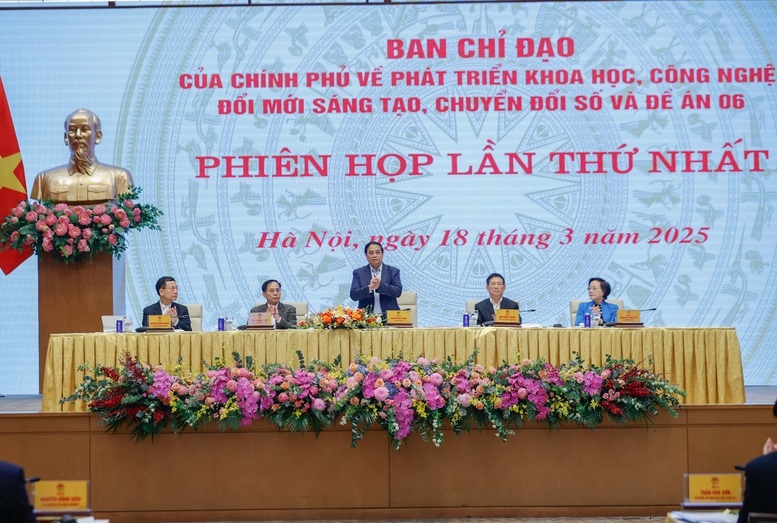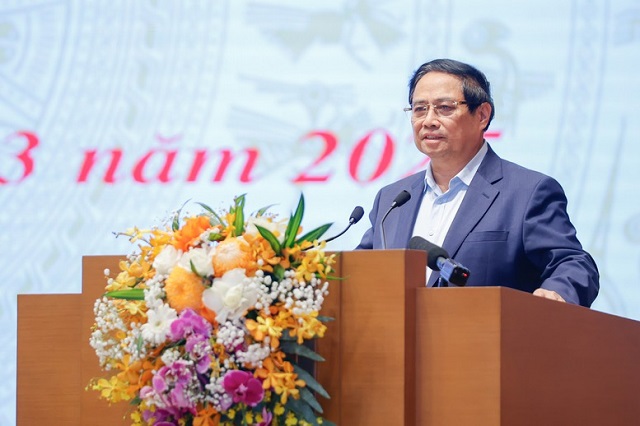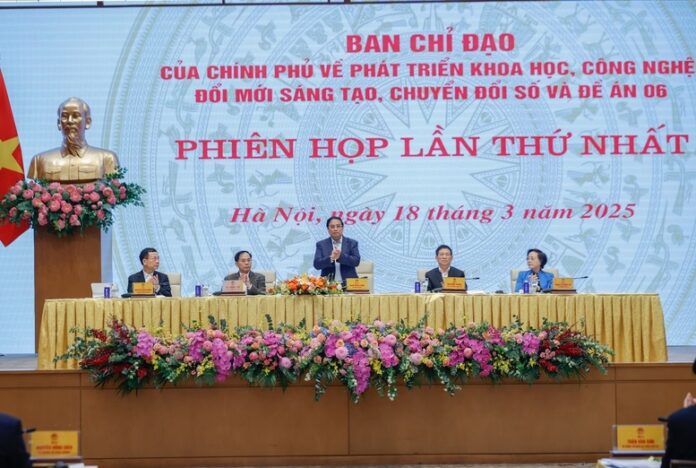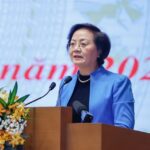
|
Prime Minister Pham Minh Chinh chaired the first meeting of the Government Steering Committee for the Development of Science, Technology, Innovation, Digital Transformation and Project 06 – Photo: VGP/Nhat Bac
|
On the morning of March 18, Prime Minister Pham Minh Chinh, Head of the Government Steering Committee for the Development of Science, Technology, Innovation, Digital Transformation and Project 06 (Steering Committee), chaired the Committee’s first meeting.
Concluding the meeting, Prime Minister Pham Minh Chinh basically agreed with the contents of the reports, discussions, and speeches. He assigned relevant agencies to absorb the opinions and complete the Prime Minister’s Conclusion for unified implementation in the near future.
The Prime Minister once again emphasized the importance of developing science, technology, innovation, digital transformation, administrative reform, and implementing Project 06. These tasks are “not optional but must be done effectively, with a strong shift from awareness to action, bringing concrete results and benefits to the nation, the people, and the country.”
The Prime Minister outlined the achievements in implementing these tasks over the past time:
First, the leadership, direction, and administration have been deployed drastically, and the implementation has been carried out synchronously with high determination from the central to local levels, creating a new momentum and spirit throughout society.
Immediately after the Politburo issued Resolution No. 57-NQ/TW dated December 22, 2024, on breakthrough development in science, technology, innovation, and digital transformation, on January 9, 2025, the Government issued Resolution No. 03/NQ-CP, promulgating an Action Program to implement Resolution 57, ensuring quality and timely compliance (50/63 provinces and cities; 14/22 ministries, ministerial-level agencies, and Government agencies have issued Action Plans to implement Resolution 57).
The Government has reorganized and established the Steering Committee (Decision No. 598/QD-TTg) with the Prime Minister as the Head (2 ministries and 15 localities have reorganized the Steering Committee).
The Government and the Prime Minister have issued 15 resolutions, 12 decisions, 9 directives, and 7 telegrams on digital transformation, administrative reform, and the implementation of Project 06. 25 meetings and national online conferences on science, technology, innovation, digital transformation, administrative reform, and the implementation of Project 06 were organized (in 2024 and the first two months of 2025).
Second, the institutions, mechanisms, and policies related to science, technology, innovation, digital transformation, administrative reform, and Project 06 have been focused on improvement.
The National Assembly has issued four laws and Resolution 193 on piloting some special mechanisms and policies to create breakthroughs in the national development of science, technology, innovation, and digital transformation. The Government has issued 32 decrees, and the ministries have issued 34 circulars within their competence.
379/1,084 administrative procedures have been simplified (so far, the total number of administrative procedures implemented by the ministries and agencies is 964/1,084, reaching 89%; eight ministries and agencies have completed 100%). All 63 provinces and cities have issued resolutions on fee exemptions and reductions for people and businesses in administrative procedures.
Third, digital transformation has continued to develop strongly. Since October 2024, Vietnam has officially commercialized 5G telecommunication services. The country’s internet speed in 2024 ranked 37th, up seven places from 2023. A new international submarine cable was put into operation, the largest to date.
E-commerce continues to grow strongly (reaching $28 billion in 2024, up 36%). Cashless payments have been widely deployed (with an average annual growth rate of 57%).
The ICT industry has made significant progress (with a revenue of $152 billion in 2024, up 10.9%). The semiconductor industry generated $18.7 billion in revenue, with 50 chip design companies and 6,000 chip engineers. Software and information technology services revenue increased sharply (reaching $18 billion in 2024, up 38.5%).
Many leading global technology corporations have invested and expanded their investments in Vietnam (Marvell – chip design; NVIDIA – research and development; SK Hynix – memory production).
The expansion of the tax base, tax administration, and electronic invoices has been actively and effectively implemented, contributing to increasing state budget revenue and ensuring the country’s financial balance. Tax revenue from e-commerce activities increased significantly (reaching VND 116 trillion in 2024, up 19.5%).
Fourth, the implementation of Project 06 has been strongly promoted, creating practical benefits for people and businesses, enhancing social management, and contributing to socio-economic development.
The National Population Database has been promoted, bringing practical benefits (completing the issuance of chip-based identity cards to 100% of eligible citizens; activating 61 million electronic identification accounts; providing 40 utilities on the VNeID application, up 27 utilities from 2023; cleaning up 45.7 million driver’s license data).
Online public services for people and businesses have been improved, gradually building a professional and modern administration (58/76 essential online public services have been deployed; 200 administrative procedures can be exploited to cut down on paperwork).
Electronic Health Books and Electronic Medical Records have been integrated with over 15.5 million citizens’ information; the Medical Data Coordination System has been put into operation (with 142 medical examination and treatment facilities in 29 localities using Electronic Medical Records). More than 2.7 million policy beneficiaries received social security allowances, and 79.2% of people received pensions and social insurance benefits through their accounts.
Fifth, Vietnam has made significant progress in international digital transformation rankings. The e-Government Development Index in 2024 increased by 15 ranks to 71st out of 193 countries. The Global Innovation Index in 2024 rose by two places to 44th out of 133 economies. The Global Cybersecurity Index in 2024 rose by eight places to 17th out of 194 countries.

|
The Prime Minister emphasized the importance of developing science, technology, innovation, digital transformation, administrative reform, and implementing Project 06 – Photo: VGP/Nhat Bac
|
On behalf of the Government, the Prime Minister commended the efforts, dedication, and achievements of ministries, sectors, and localities, the strong direction of the members of the previous Government Steering Committees, the important contributions of the People’s Public Security Force, and the consensus, active participation, and support of the people and businesses.
At the same time, the Prime Minister pointed out the existing shortcomings and limitations and the tasks that are behind schedule. There are still five decrees that have not been issued; many tasks in the programs, plans, and projects are behind schedule, with no significant changes.
Digital transformation has not developed proportionally to its potential and advantages and has not become a driving force for economic growth. Currently, only about 30% of businesses apply digital technology in their production and business activities. Remote and mountainous areas still face difficulties in accessing the Internet.
Administrative reform has not received adequate attention, and coordination between ministries, sectors, and localities has been slow and ineffective in some cases. The reduction and simplification of administrative procedures have been slow, and the quality of online public services has not been high (the rate of providing online public services on the National Public Service Portal has reached only 69.5%, while the target for 2024 was a minimum of 80%; the rate of digitizing dossiers and results of administrative procedure handling has reached only 63.4%, while the target for 2024 was a minimum of 80%).
Human resources for science, technology, innovation, digital transformation, administrative reform, and the implementation of Project 06 have not met the requirements in terms of quantity, quality, distribution, work attitude, and professional ethics. There is no mechanism for public-private cooperation in mobilizing resources…
According to the Prime Minister, these shortcomings and limitations are due to both objective and subjective reasons, but the main reason is subjectivity, especially in some ministries, sectors, and localities, where the role of the leaders has not been promoted, discipline has not been strict, and there has been a lack of effective coordination between agencies and units.
Forming Large-Scale Strategic Technology Enterprises
Regarding future orientations, the Prime Minister outlined five guiding viewpoints and thoughts:
First, administrative reform and the development of science, technology, innovation, and digital transformation are closely linked, promoting and supporting each other, with the people and businesses as the center and the subject.
Second, administrative reform, science, technology, innovation, and digital transformation are objective requirements and strategic priorities, a “must-do” choice.
Third, with the spirit of “the Party leads, the Government unifies, the National Assembly agrees, the people support, and the country expects, we only discuss how to do it, not whether to do it”; we must act with a focus on key tasks, without spreading ourselves too thin or doing things halfway; we must get things done properly and thoroughly.
Fourth, we must resolutely shift from a passive state of receiving and processing administrative procedures to an active state of serving the people and businesses.
Fifth, we must give praise and criticism clearly, promptly, appropriately, and effectively.
Along with the five guiding viewpoints and thoughts, there are three important tasks for all levels, sectors, and localities, as well as subjects: (1) Promote national digitization; (2) cut and simplify administrative procedures without limits, doing as much as possible; (3) develop comprehensive digital citizens. The spirit is to “streamline the apparatus, connect the data, and govern intelligently.”
There are also three key tasks in the near and long term: (1) Improve the institutional system thoroughly, with the immediate proposal to the National Assembly to use one law to amend multiple laws; (2) develop comprehensive infrastructure, promoting the development of 5G coverage, optical cable and satellite systems, especially databases; (3) all levels, sectors, localities, businesses, and educational institutions must build and implement human resource training plans (from basic digital literacy to advanced and high-quality professional skills).
Outlining three specific tasks to focus on, the Prime Minister requested: (1) Handle administrative documents and, especially, administrative procedures in the digital environment; (2) promote and popularize cashless payments, with a specific roadmap to improve this aspect further; (3) promote electronic tax collection and the application of electronic invoices generated from cash registers, especially for catering and retail services.
Regarding the development of science, technology, innovation, and digital transformation, the Prime Minister requested the formulation and submission of the National Program for the Development of Technology and Strategic Industry, including the development of a system of research, testing, and national key laboratories, focusing on strategic technologies.
He also requested the formulation of a proposal to form large-scale strategic technology enterprises in the country to develop digital infrastructure, digital human resources, digital data, strategic technologies, and cybersecurity.
The Prime Minister asked for the establishment of a Fund for the Development of Strategic Industries and the formulation of a Program for the Development of a Digital Government and the implementation of a Paperless Government, with direction and administration based on data in the digital environment.
He directed the National Data Center to be operational in 2025, with ministries and localities building their databases. He also called for the early opening of a digital data exchange floor and the promotion of the development of a data transmission system via satellite and high-speed broadband optical cables.
Regarding administrative reform, the Prime Minister requested a continued push to provide and improve the quality and effectiveness of online public services, in conjunction with the reorganization of administrative units, to avoid work congestion. He emphasized the need to promote the reduction and elimination of administrative procedures, shifting from a “requesting” state of providing public services to an “active” state of serving the people. In 2025, 100% of airports, seaports, and border gates should apply biometric technology and the VNeID platform.
To promote the implementation of Project 06, the Prime Minister directed close adherence to Directive No. 07/CT-TTg, with the development of an implementation plan that includes specific solutions and a detailed roadmap, ensuring “clear people, clear tasks, clear time, clear responsibilities, and clear results,” with the specific responsibilities of each agency and individual.
The ministries and sectors are responsible for reducing the number of dossiers for 324 administrative procedures with paper-based information that has been integrated into the electronic identification account. This task should be completed in the second quarter of 2025.
The localities were urged to expedite the digitization of household registration and land data and proactively research a reuse plan for the digitized data to simplify 200 administrative procedures within their competence (10 localities: Binh Duong, Dong Nai, Ba Ria-Vung Tau, Ho Chi Minh City, Bac Giang, Ha Nam, Nam Dinh, Quang Nam, Quang Ngai, and Khanh Hoa, have exploited land data in handling residential registration procedures).
– 13:25 18/03/2025
DHL: Vietnam to Join the World’s Fastest-Growing Trade Group Soon
Vietnam is projected to have a compound annual growth rate (CAGR) of 6.5% in the period 2024-2029, outpacing the 6.2% growth rate recorded in the previous period of 2019-2024.
U.S.-Vietnam Relations: Trade Agreements Worth $90.3 Billion Signed
The total value of economic and trade agreements between Vietnamese and American businesses, expected to be implemented in the phase from 2025 onwards, amounts to a staggering $90.3 billion. This will create hundreds of thousands of jobs for workers in both countries, opening up a world of opportunities and strengthening the economic ties between Vietnam and the United States.
Unlocking Affordable Housing: 3 New Projects Eligible for the VND 120,000 Billion Loan Package
The Binh Dinh province welcomes three new social housing projects, all of which meet the criteria to benefit from the VND 120,000 billion credit program. With a combined loan requirement of over VND 800 billion, these projects are set to make a significant impact on the region’s affordable housing landscape.














































